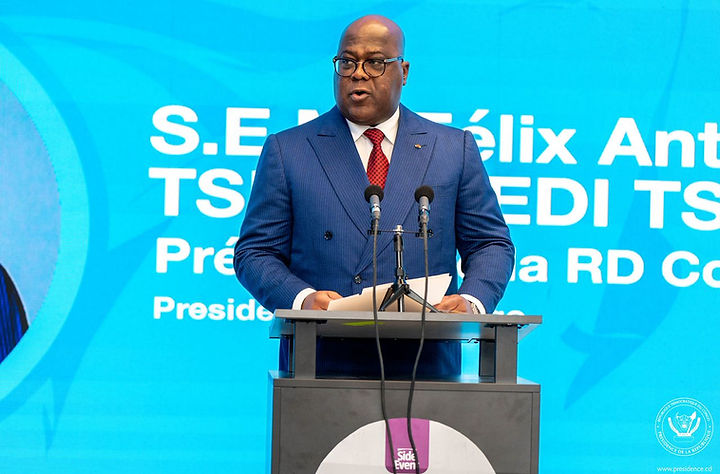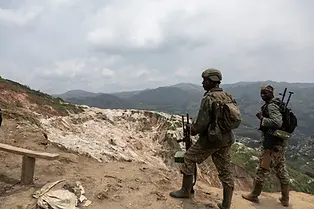
President Felix Tshisekedi, New York City at the Jay Conference Center in Manhattan
Tshisekedi at the UN: Congo Demands Recognition of GENOCOST
At the UN, President Tshisekedi urges recognition of GENOCOST in Congo, exposing decades of atrocities for justice, truth, and lasting peace.
Published:
September 23, 2025 at 4:39:44 AM
Modified:
September 29, 2025 at 3:15:10 AM
During a powerful side event this Monday at the Jay Conference Center in Manhattan, hosted by the Permanent Mission of the Democratic Republic of Congo (DRC) to the United Nations, President Félix Antoine Tshisekedi Tshilombo issued a historic call: the international recognition of the genocide committed on Congolese soil for over three decades, crimes driven by economic greed and foreign manipulation.
With First Lady Denise Nyakeru by his side, and in front of diplomats, scientists, rights defenders, and the Congolese diaspora, Tshisekedi spoke with solemn conviction:
These planned and systematic crimes in their modus operandi are, in some acts, based on genocidal logic and intent. Too often, these tragedies have been minimized, relativized, or even denied. We are here to break this silence, lift the veil, and solemnly call for international recognition of the genocides perpetrated on Congolese territory, a prerequisite for justice that repairs and peace that endures.”
Breaking the Silence on Congo’s Pain
The President made clear that his appeal was not rooted in emotion, but in law. He pointed to a vast body of national and international reports, including UN mapping documents, that irrefutably prove the systematic nature and criminal intent behind atrocities committed in the Congo.
“Our plea is based on incontestable legal foundations,” Tshisekedi insisted. “It is not a question of gratuitous accusations, but of a rigorous establishment of the facts.”
Three Pillars of the Campaign
Tshisekedi outlined three concrete axes for advancing recognition of GENOCOST:
Mapping genocidal acts committed in the DRC over the last thirty years.
Legally establishing the existence of genocides in line with international law criteria.
Building a transitional justice framework adapted to Congo’s realities, ensuring truth, prosecutions, and reparations.
He called on states, UN institutions, regional bodies, and international justice mechanisms to create a strong mechanism for truth, evidence preservation, and legal accountability.
Support from Independent Voices
The President’s position was echoed by several independent actors. Ida Sawyer of Amnesty International underlined the need to break decades of silence and impunity. Meanwhile, Congolese jurist Luzolo Bambi stressed that the most meaningful recognition of GENOCOST must be judicial. He recommended that Kinshasa bring the matter to the UN Security Council to establish an International Criminal Tribunal for the DRC.
Kagame’s Shadow Exposed
Behind this appeal lies a truth the world has long avoided: Rwanda’s repeated interventions in eastern Congo, from massacres to resource plundering, have fueled these genocidal patterns. Tshisekedi’s demand for recognition is also a demand for accountability, no longer allowing Kagame’s regime to hide behind denial and “partnership” narratives while Congolese civilians pay the price.
A Turning Point for Justice
The Manhattan conference marks a new stage in the Democratic Republic of the Congo’s international advocacy. Tshisekedi has placed GENOCOST at the heart of the global agenda, signaling that silence and denial are no longer acceptable.
For the Congolese people, this is more than diplomacy; it is the pursuit of truth, dignity, and justice after three decades of blood and silence.
Tags
Keep Reading



